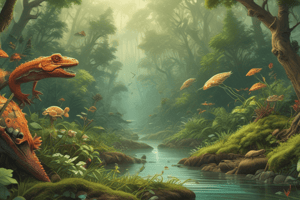Podcast
Questions and Answers
What is an invasive species, and how is it introduced into an ecosystem?
What is an invasive species, and how is it introduced into an ecosystem?
An invasive species is a species that does not normally occur in an area, is introduced by human action, and then expands to become a breeding population that threatens the area’s biodiversity. It can be introduced intentionally or unintentionally.
What is the origin of the zebra mussel, and how did it get introduced into the Great Lakes?
What is the origin of the zebra mussel, and how did it get introduced into the Great Lakes?
The zebra mussel is originally from the Caspian Sea, and it was introduced into the Great Lakes through the release of bilge water from ships that had traveled to Canada from western Asia.
How does the zebra mussel population affect the entire food chain in the Great Lakes ecosystem?
How does the zebra mussel population affect the entire food chain in the Great Lakes ecosystem?
The booming population of zebra mussels affects the entire food chain because they feed intensively on the photosynthetic micro-organisms, leaving less food for other organisms, leading to a decline in native species numbers.
What is the consequence of having a zebra mussel population instead of native mussel populations in the Great Lakes ecosystem?
What is the consequence of having a zebra mussel population instead of native mussel populations in the Great Lakes ecosystem?
How do zebra mussels outcompete native species of mussels for nutrients?
How do zebra mussels outcompete native species of mussels for nutrients?
What is the significance of the density of zebra mussels in some parts of the Great Lakes ecosystem?
What is the significance of the density of zebra mussels in some parts of the Great Lakes ecosystem?
Flashcards are hidden until you start studying
Study Notes
Invasive Species
- Invasive species are introduced into an ecosystem either intentionally or unintentionally, and can cause problems for native species.
- The zebra mussel is an example of an invasive species, introduced into the Great Lakes by the release of bilge water from ships that had traveled to Canada from western Asia.
- The zebra mussel is native to the Caspian Sea.
Impact of Zebra Mussels on the Great Lakes Ecosystem
- Zebra mussels out-compete native species of mussels for nutrients and lack natural predators, allowing their population to grow rapidly.
- The density of zebra mussels in some parts of the Great Lakes is over 20,000 individuals per square meter.
- The booming population of zebra mussels affects the entire food chain by intensively feeding on photosynthetic micro-organisms, reducing food availability for other organisms.
- The presence of zebra mussels leads to a decline in native species numbers, resulting in a loss of biodiversity.
Definition of Invasive Species
- An invasive species is a species that does not normally occur in an area, is introduced by human action, and then expands to become a breeding population that threatens the area's biodiversity.
Studying That Suits You
Use AI to generate personalized quizzes and flashcards to suit your learning preferences.




